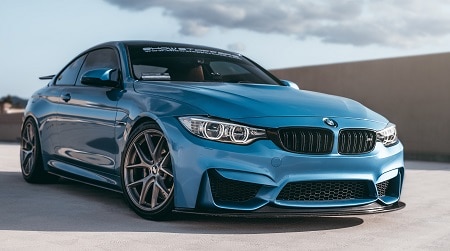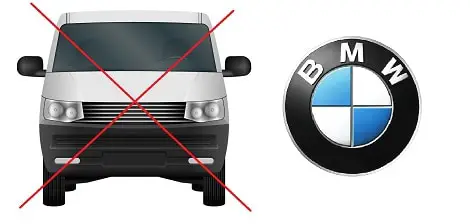BMW Doesn’t Make Vans Because It Doesn’t Align With Their Brand Identity
- BMW primarily focuses on the driver experience
- They focus on performance cars and motorcycles, which are marketed differently than vans
- They have attempted to change their branding before with little success
At first this question might be a bit strange. Almost all major auto makers make more than one type of vehicle.
Ford makes everything from small cars for the consumer market to heavy duty commercial trucks, for example. Volvo, which is primarily known for their sedans and SUVs, has a very large heavy truck business in the US and Europe.
At the same time, many auto makers like Toyota and Honda don’t make vans in the US, so why should BMW? Are all brands created equal?
There Are Already Competitors in the Van Market
The auto industry was not globalized for most of the 20th century in the way it is today. Cars were very different in different regions, and these differences led to different branding objectives.
Nevertheless, this still doesn’t explain why BMW never made a van. The other major German automakers, Mercedes-Benz, Volkswagen, and Audi all made some kind of van after the war. BMW never did.
Look at BMW’s main competitor, Mercedes-Benz. While Mercedes is best known today for their luxury sedans and SUVs, their commercial van division is huge are extremely popular in the United States. They are also a major player on the heavy truck and bus market in Europe, making them much more diverse than other luxury automakers.
Mercedes’ van segment alone generated 113 million Euros of profit in 2019.
Their Branding Is Not Aligned With Vans
Just because a competitor is succeeding in a niche doesn’t necessarily mean it makes sense for BMW to expand their business. Although it seems like it would make sense for BMW to make all sorts of vehicles, this isn’t necessarily the case if the branding is not aligned with that goal.
Mercedes is able to sell various types of vehicles
This is where somebody might point out that Lamborghini, a brand focusing on high performance cars, makes tractors. Surely, that is off brand. I disagree.
Lamborghini, while marketing the driving experience, is not primarily relying on this market positioning. Legend says that Lamborghini began when its founder tried a Ferrari and felt that he could make a better version.
If Lamborghini entered the van space, for example, they could position themselves as having built a better van. They could say that they examined what was available on the van market and that their product is better.
That message is on-brand, and Lamborghini could sell their vans at a premium if they so choose.
They Already Have Lots of Car Market Brands

While the BMW brand focuses on the luxury and enthusiast market segment, BMW group owns other brands as well, such as MINI and Rolls Royce. While the former also focuses on the enthusiast segment, Rolls Royce targets the ultra-wealthy with their hand-built luxury sedans.
Those familiar with Rolls Royce also know that they’re a major player in the aircraft engine business. However, BMW only owns the luxury car segment of their business.
The Rolls Royce military and aircraft business is a separate company unaffiliated with BMW.
However, it is noteworthy that these two industries are served with the exact brand. Rolls Royce cars are not exactly known for quality. Even though they are not mass produced and the marketing leans heavily on the handmade characteristics, Rolls Royce cars are notoriously unreliable.
The aircraft engines are not handmade and are considered much better quality than the cars.
LG and Samsung, both Korean conglomerates, make all sorts of products, from mobile phones to refrigerators. Mitsubishi is a Japanese company that’s similar, making air conditioners and cars among other things.
They get away with it because their branding doesn’t lean too heavily on any one category.
BMW Also Makes Motorcycles
Apart from cars, BMW is also successful in the motorcycle segment. In 2021 alone, BMW delivered nearly 200,000 motorcycles and scooters. Why are they successful in this segment?
It’s simple. Motorcycles are perfectly aligned with their driver focused branding.
Motorcycles are very much targeted toward enthusiasts who like the experience of being in the open air and the adrenaline that comes with driving a motorcycle.
Mercedes-Benz, for example, would have difficulty marketing a motorcycle with their existing brand position. It doesn’t make sense that the manufacturer of ultra-refined luxury cars and reliable industrial vehicles would enter a niche where experience is key (and said experience significantly differs from a luxury vehicle).
Van’s Don’t Fit the BMW Customer Type and Brand
BMW’s luxury competitors primarily target older, affluent customers with cars that are quiet, refined and comfortable. The driving experience is not emphasized, and most of these customers are not car enthusiasts.
BMW, however, has very targeted branding, calling their cars the “Ultimate Driving Machine” since the 1970s. This slogan was one of the most successful in the history of marketing, and many to this day know BMW by this phrase.
The company tried the slogan “Joy Is BMW” in 2006 to keep their branding current. This was an attempt to keep up with trends in the market. Many consumers began emphasizing safety and fuel efficiency.
While this might have been true for the market at large, the most committed BMW enthusiasts were still looking for a car with a particular driving experience.
Realizing this was a mistake, BMW later returned to their original message with a new slogan, “Designed for Driving Pleasure.” On the BMW US website, their latest electric cars are currently marketed as the “Ultimate Electric Driving Machine.”
This change in marketing message is one that many companies have learned the hard way, such as when Coca-Cola famously changed their recipe in 1985. This decision was quickly reversed as it was clear the public preferred the old flavor.
This brings us back to BMW and entering new market segments. If BMW is a brand focused on performance and the driving experience, why would they make a van? Nobody is buying a van because it’s fun to drive or accelerates from 0 to 60 miles per hour in 5 seconds.
Vans are bought for their utility, whether for commercial or recreational purposes. This is so off brand for BMW that it would be a very bad business decision to pursue the van segment as the brand exists currently.
They Started Making Vehicles Relatively Recently
Although BMW is best known for their performance road cars, the manufacturer has a history of making all kinds of vehicles. They even made airplanes during World War I.
BMW was initially founded from a merger of three companies in 1916 that made aircraft engines. Even after the war, BMW continued making aircraft engines throughout the Second World War.
There wasn’t a mass market for cars in Europe at that time, and military technology was evolving rapidly.
World War II changed the European auto market. Germany’s infrastructure was destroyed, and there was no longer a demand for military equipment and aircraft. Europe was also rebuilding after the war focusing on developing infrastructure both for private cars and for modernized public transportation.
There was a private car revolution in Europe with the introduction of the Mini and Fiat 500 in the 1950s, which made cars affordable for many European families.
BMW attempted to enter this market segment with the Isetta. This was a tiny car similar to the original Fiat 500 targeting this newly middle-class European market.
It wasn’t until 1968 that BMW introduced a car for the US market. I think that their experiments in different market segments lead to the realization that their brand is best suited for the mid-to-high-end performance market.
The Future of BMW is in High Performance Vehicles

BMW is now focusing on high performance electric vehicles, which is a good alignment of market trends shifting toward electric vehicles.
Simultaneously, BMW is focusing on their vehicles’ performance and the driver experience, which their customers are accustomed to rather than efficiency and environmentally friendly characteristics, which is their competitors’ primary messaging.
BMW should focus on their luxury cars and motorcycles. They already experimented with altering their brand position, and their failure shows what kind of brand they are and that they shouldn’t alienate their core demographic by expanding their offering.
However, should BMW decide to enter the van space, they should create a subsidiary brand that is marketed very differently from their core offering. They could also enter into a joint venture with an existing manufacturer and make a van.
BMW has already experimented with joint venture projects, most notably in the Chinese market as foreign corporate ownerships restrictions exist there (although this is changing).
So, BMW enthusiasts, if you’re anticipating a BMW anytime soon (and let’s be honest, why would you be?), it’s not happening.

